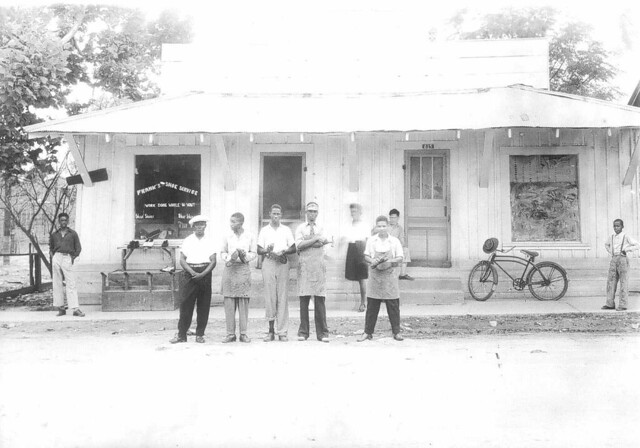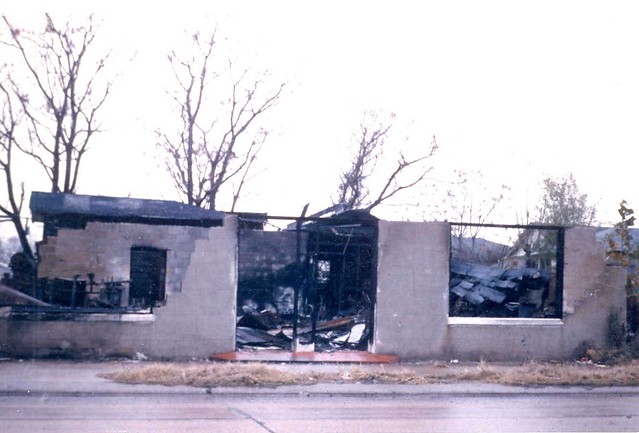
Frank Morris is tallest in the picture, 4th from left in the line wearing visor. Frank is seen here standing in front of his shoe shop in Ferriday, La circa 1950s. Photo courtesy of the Concordia Sentinel and William Brown, 2010. www.coldcases.org
I'm covering the developments in the Stanley Nelson's Frank Morris murder investigation at Colorlines today:
On Dec. 10, 1964, a 51-year-old, black shoe-shop owner named Frank Morris was burned alive inside his store in Ferriday, La. Morris miraculously survived severe burns to all of the skin on his body, was hospitalized and lived four more days in agony and morphine-induced delirium before he finally died. On his deathbed, Morris told the FBI how his store was broken into and how the intruders had poured gasoline inside the store. He said there were two white men.
The FBI investigated twice in the 1960s with no conclusion. Today, in Ferriday’s Concordia Sentinel, its editor Stanley Nelson reports compelling evidence that Leonard Spencer, an admitted former member of the Ku Klux Klan living in Richland Parish, La., helped set the 1964 fire that killed Frank Morris.
Remarkably, Nelson’s witnesses to confessions by Spencer are his former brother-in-law, Bill Frasier, and his son, Boo Spencer. Additionally, Leonard Spencer’s ex-wife, Brenda Rhodes, attests to hearing an alleged fellow Klansman and close friend of Spencer confess to working with Spencer to set the shoe shop on fire.
“I’m somewhat encouraged,” Nelson told me in a telephone interview. “I think there’s evidence to believe that the majority of the white folks would like to see these cases solved, too.”
Many of the familiar civil rights era racial murders are stories of retaliation for activism. The victims’ names are embedded in our cultural memory of the era’s violence: James Chaney, Andrew Goodman and Michael Schwerner; Medgar Evers, Vernon Dahmer, Wharlest Jackson, Louis Allen, Herbert Lee, Birdia Keglar and Adlena Hamlett---to name just a few in Mississippi.
But there were other victims, like Frank Morris, who were targeted for reasons that are less overtly political, and perhaps even more insidious. These are stories in which there seem to be an accumulation of hostilities towards a black male that reach an unpredictable breaking point. Three main things animate the hostilities towards this different class of victim, often occurring in combination: their financial success, their willingness to stand up to whites and allegations of their having liaisons, real or perceived, with white women.
Stanley Nelson's articles:
- Rayville man implicated in Frank Morris case (Concordia Sentinel)
- Feds vow to solve Frank Morris murder (Concordia Sentinel)
More coverage of news implicating Arthur Leonard Spencer in 1964 murder of Frank Morris
- Paper names ex-Klansman in civil rights murder (CNN)
- Solving A 1964 Cold Case: Mystery Of Frank Morris (NPR)
- Reporter on Quest to Close 1964 Civil Rights Case (NYT)
- Murder at the Shoe Shop - Cold Case Documentary (CBC)
- 46 Years Later: Justice for a Civil Rights Murder Victim (The Takeaway)
- Stanley Nelson’s reporting could bring justice in unpunished 1964 killing (Jerry Mitchell)
Stanley Nelson and I both investigate civil rights era racial violence in conjunction with the Civil Rights Cold Case Project.








